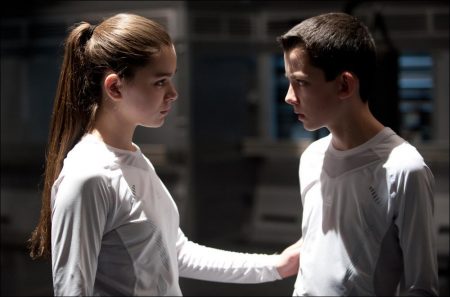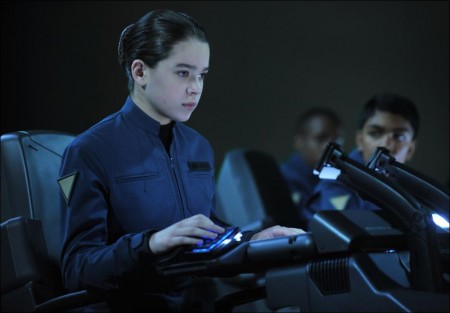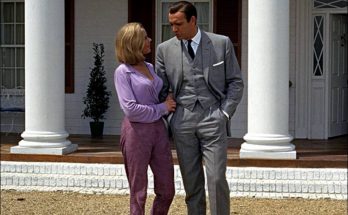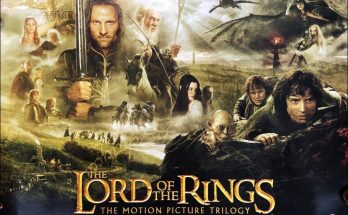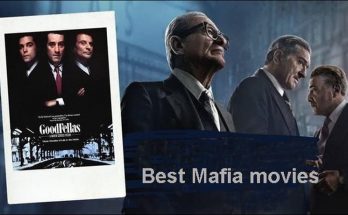A brilliant and remarkably gifted 12‐year‐old is trained to become Earth’s ultimate military leader in Ender’s Game, the long‐awaited big‐screen adaptation of the classic, Hugo and Nebula Award winning novel.
After surviving a devastating attack by the insect‐like Formics, the people of Earth have spent years readying themselves for a repeat attack by nurturing a new generation of child geniuses to be trained as warriors. The planet’s best and brightest youngsters are selected to attend Battle School, an orbiting space station where they compete for a chance to become a commander of the International Forces. Using advanced computer simulations and rigorous game‐like exercises, they train in an atmosphere of violence and intense competition, knowing that only one will be selected to lead.
Ender Wiggins (Asa Butterfield) is exceptional, even among his extraordinary classmates. His unique combination of intelligence, empathy, and strategic brilliance makes him a standout in the classroom and in the Battle Room—a zero‐gravity playground where games of futuristic laser tag test the trainees’ strategic and physical abilities. But Ender’s singular gifts inspire envy in his fellow recruits, and the school’s commander, Colonel Hyrum Graff (Harrison Ford), deliberately alienates Ender from the other children in order to hone his individual leadership skills.
An outsider at first, Ender, with his preternatural understanding of human nature gradually builds a coalition among his peers, and is soon promoted to command school—located on a distant planet once used by the Formics as a forward staging post for their invasion of Earth. Under the severe tutelage of Mazer Rackham (Ben Kingsley), the brilliant general who defeated the Formics years earlier, Ender is rapidly promoted to lead his fellow students in simulated war games against enemy forces.
Certain that another attack by the Formics is imminent, Graff and Rackham believe they have only weeks to ready Ender to lead the International Fleet in a battle for planetary survival. But as the boy prepares to face his final test, he develops gnawing doubts about the monumental task that lies ahead. Is this the best stragefy for achieving peace?
Orson Scott Card’s acclaimed futuristic novel Ender’s Game debuted in 1985 and became an instant classic, earning the coveted Hugo and Nebula Awards, as well as the devotion of millions of fans worldwide. A startlingly original adventure as well as a poignant and inspiring coming‐of‐age story, Ender’s Game’s prescient view of future technology and insights into human nature have made it a perennial favorite with adults and children for almost 30 years. It has been translated into 28 languages and is included on the United States Marine Corps’ Professional Reading Program list, as well as the American Library Association’s list of 100 Best Books for Teens.
The novel’s immense popularity and vivid imagery made a film adaptation seem inevitable, but creating Card’s gorgeously imagined future and intricately plotted storyline would take an exceptionally determined and talented team of filmmakers.
Producer Lynn Hendee, president of Chartoff Productions, has spent more than a decade shepherding Card’s book through development. She and her colleague Robert Chartoff have become close to Card over the years, and serve as the North Carolina‐based author’s trusted ambassadors to the film industry.
“I became involved with the book about 15 years ago,” Hendee says. “Bob Chartoff asked me to read it. I was not a science fiction aficionado, but I wasn’t able to put this book down. The idea for the film has gone through several incarnations since then, but it wasn’t until we met Gigi Pritzker and Linda McDonough that things really started to happen. It has been a fascinating journey getting here.”
Pritzker, CEO of OddLot Entertainment, had been tracking the rights to the novel ever since her teenage nephew handed her the book, saying it would make a great movie. “That was the beginning of the journey for me,”
Pritzker says. “Not only did the book have the ability to inspire an ongoing conversation between a 14‐year‐old and an adult, it had all the elements to make a great movie. It deals with universal themes that people of all ages grapple with. It’s set in an environment that’s unique and exciting and compelling—and it’s all wrapped up in this fantastic adventure.”
She shared the book with her colleague Linda McDonough, executive vice president of OddLot Entertainment and another of the film’s team of producers. McDonough was struck by the intelligence and perceptiveness of a story about a gifted boy thrust into the single minded world of military training. “It’s a compelling story that inspires important discussions about leadership, conflict resolution and empathy,” she says. “For young adults, there’s also a recognition of what it was like to feel isolated, to feel like you are on the outside. The world can be a scary place when you feel that way.”
Approached by Pritzker about partnering on a film version of Ender’s Game, Hendee was impressed by her passion and respect for the novel and quickly agreed to work with OddLot. Pritzker and McDonough then began assembling a production team that is unusual in its depth and breadth. “We always knew that to try to bring a book like this to the screen was going take a lot of people pulling on the same oars, really working together as a team,” Pritzker says.
Alex Kurtzman and Roberto Orci of K/O Paper Products were asked to lend a hand. McDonough knew the pair’s previous experience with epic adaptations like Transformers and Star Trek would be invaluable to the ambitious project. “We felt strongly we needed an 800‐pound gorilla as a producing partner,” she says, “because the film is enormous in its scope and its budget. Alex Kurtzman and Bob Orci helped pave the road to production.”
“They gave the project some heat,” adds Hendee. “It was understood in the film industry that if they loved it, it had to be good.”
It turned out that Orci had read the book when he was 12 and always wanted to see it made into a movie. “I think that finally enough people who read this book when they were young have come of age and achieved a certain amount of success in Hollywood,” says McDonough. “Combine that with the advances in film technology and Ender’s Game is finally coming to the screen.”
Orci says that both he and Kurtzman are longtime fans of the novel. “It captured our imaginations when we were teenagers and it has stuck with us ever since,” he says. “It’s a challenging book, but it’s also extremely fun and accessible. It’s rare that you get that in one package. We never thought we’d get to work on it, even though it’s one of the things that made us want to come into this business.”
The producing team continued to grow when the filmmakers took an unusual step by enlisting Digital Domain as a partner. For the first time ever, the visuals effects giant is helping to produce a film beginning at the development stage. “Ender’s Game has a multitude of rich environments, so we brought on Digital Domain as soon as possible,” says Pritzker. “Having them join us as an integral partner gave us the ability to delve into the look of the film in a much richer way.”
Ed Ulbrich, former CEO of Digital Domain and a producer of the film, says that this is the realization of a 20‐year vision for the company. “When Digital Domain first formed in 1993 with James Cameron, the idea was to build a digital studio that would become self‐sufficient and create films in a new way,” he explains. “We’ve approached this film that way. We were involved during the writing process, and the visual development was as important as the story development.”
Even as the script was evolving, Digital Domain was already creating the world of the film, a world Ulbrich likes to refer to as the “the Ender‐verse.” “This is a very ambitious movie even for Digital Domain,” he says.
“Coming in early was critical. Having everybody on common visual ground from the very beginning facilitated the storytelling and the performance. Saying that we did ‘visual effects’ doesn’t really capture the scope of our involvement.”
The producing team spent a year interviewing writers to adapt Card’s novel for the screen before selecting Gavin Hood, who would also direct Ender’s Game. Hood’s unique résumé includes films that range from the intimate Tsotsi, the 2005 Oscar® winner for Best Foreign Language Film, to epic blockbusters including X‐Men Origins: Wolverine.
“Gavin had worked on small, independent films in South Africa that had great personal meaning,” says Pritzker. “But he had done big studio special‐effects films, as well. He could handle both sides of the equation. In addition, he’d been in the military in South Africa as a young man and that brought an understanding of the hierarchy of power in that environment, giving the story a real layer of depth that we might not have gotten with a different writer.”
In their initial meeting, Hood won over the producers with his enthusiasm, imagination and emotional connection to the material. “Meeting Gavin was a transformative moment,” says McDonough. “I cried at the end of his pitch. That’s what we want people to experience when they see this movie.”
“Gavin was the one, just as Ender is the one,” Hendee says. “He’s a force of nature. Many directors were interested in this film, but his passion and his vision were contagious and compelling. His core ideas for both the writing and the directing of the film, the visual components and the style were all there from the beginning.”
Hood was excited by the potential of this story to transport audiences to a future world very different from our own in order to illuminate issues humans face today. “Science fiction is wonderful at generating discussion about themes and ideas that are important in the contemporary world,” he says. “It allows conversations that might become inflammatory in a political context to take place in an imaginary space.”
Ender’s Game examines critical and timely ideas such as the true meaning of leadership, the balance between good and evil and the justification for war. “Is the way we win as important as winning itself?” says Hood.
“Where’s the line between good and evil, and don’t we all contain both, sometimes in the same moment? Is real leadership the exercise of brutal authority in order to get people to do what you want? Or is it more about drawing them in to get the best out of them? Ender is struggling with these questions throughout the film.”
At its heart, Ender’s Game is a true hero’s journey, according to the screenwriter and director. “A young man leaves the safety of his home to embark on an incredible adventure. He meets various characters who influence him one way or the other, both adults and other children.
In some ways, it’s very much like Tsotsi in that it follows one particular character’s journey and growth closely. On the other hand, it’s quite spectacular visually, so my experience on big visual effects and action movies was very helpful in achieving environments like the zerogravity scenes. I hope that Ender’s Game brings the best of both worlds together.”
Adapting any book into a movie is difficult and Ender’s Game, with its myriad characters and array of subplots, presented some unique hurdles for the screenwriter‐director. “In addition,” notes Hood, “the book is written almost entirely from Ender’s point of view. The author tells you a lot about what the character is thinking and feeling. Our biggest challenge in adapting this was how to preserve the spirit and the intellect of Ender Wiggin without resorting to a great deal of voiceover.”
Faced with Card’s sprawling narrative, Hood compressed the story from six years into one. “At the beginning of the book, Ender is six years old,” says Hood. “At the end, he’s 12. Practically speaking, that would be very difficult to do with an actor, so the first order of business was reorganizing the timeline. Setting it over a period of about a year allowed us to use the same actor throughout.”
He also winnowed the storyline down to a more manageable scope by concentrating on Ender’s struggle to become the leader everyone believes he has the potential to be. “A film is a two‐hour experience, whereas a book is something you read, put down, come back to,” Hood says. “We had enough material for several films, so we had to decide what aspects of the book were most important. We came to focus on Ender’s story.”
Hood worked with the producers for about two years to complete the script—time that gave him a deeper understanding of the characters and the story he wanted audiences to experience. “The process of writing a script gives me a massive amount of preparation, so I think I direct better when I’m working with material that I’ve also had to wrestle with as a writer.”
After dedicating so many years to bringing Ender’s Game to the screen, Hendee is more than satisfied with the outcome. “Ender’s Game has endured almost 30 years because it asks its audience to consider questions about humanity and society, and it never offers easy answers,” she says. “From one end of the political spectrum to the other, no matter what gender or culture, people relate to it.”
And it’s all wrapped up in a rip‐roaring, eye‐popping, sci‐fi adventure, adds Orci. “The themes are adultoriented and so is the film,” says Orci. “But there is also the wish‐fulfillment of going into outer space, learning how to essentially fly in zero‐g, piloting these ships—there’s a true adventure to it. This really is an epic and it doesn’t patronize the audience just because there are young people in the cast. It would be a great story in any venue.”
Ender’s Game
Directed by: Gavin Hood
Starring: Harrison Ford, Abigail Breslin, Hailee Steinfeld, Asa Butterfield, Ben Kingsley, Viola Davis
Screenplay by: Gavin Hood
Production Design by: Sean Haworth, Ben Procter
Cinematography by: Donald McAlpine
Film Editing by: Lee Smith, Zach Staenberg
Costume Design by: Christine Bieselin Clark
Set Decoration by: Peter Lando
Music by: Steve Jablonsky
MPAA Rating: PG-13 for some violence, sci-fi action and thematic material.
Studio: Summit Entertainment, Lionsgate Films
Release Date: November 1, 2013
Related Link: View the Full Production Notes for Ender’s Game
Views: 143
